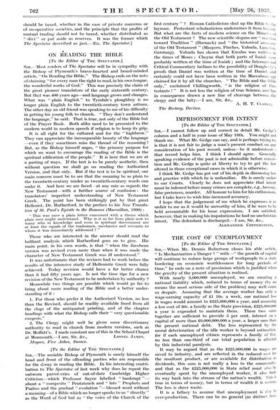ON READING THE BIBLE
[To the Editor of THE SPECTATOR.] SIR,—Most readers of The Spectator will be in sympathy with the Bishop of Plymouth's brave-hearted and broad-minded. article, " On Reading the Bible." The Bishop ends on the note of claiming " for every man the right to read, in his own tongue, the wonderful works of God." This was precisely the claim of the great pioneer translators of the early sixteenth century.. But that was 400 years ago—and language grows and changes. What was " plain English " to Tyndale's ploughboy is no longer plain English to the twentieth-century town artisan. The other day an old friend was speaking to me of his difficulty in getting his young folk to church. " They don't understand the language," he said. That is true, not only of the Bible but of the Prayer Book. Both alike need to be presented to the modern world in modern speech if religion is to keep its grip.
It is all right for the cultured and for the " highbrow." They can appreciate the incomparable beauty of the language —even if they sometimes miss the thread of the reasoning ! But, as the Bishop himself urges, " the primary purpose for which we want to entourage the reading of the Bible is the spiritual edification of the people." It is here that we are at a parting of ways. If the test is to be purely aesthetic, then without question we shall go on reading the • Authorized Version, and that only. But if the test is to be spiritual, our main concern must be to see that the meaning be as plain to the twentieth-century reader as twentieth-century words can make it. And here we are faced—at any rate as regards the New Testament—with a further source of confusion : the translators' imperfect understanding of New Testament Greek. The point has been strikingly put by that great Hellenist, Dr. Rutherford, in the preface to his New Transla- tion of St. Paul's Epistle to the Romans (Macmillan, 1900) : " This was once a plain letter concerned with a theme which plain men might understand. Why is it so far from plain now to many who in knowledge and even in spiritual discernment are at least the equals of the tradesmen, -mechanics and servants to whom it *as immediately addressed ? "
Those who are interested in the answer should read the brilliant analysis which Rutherford goes on to give. His main point, in his own words, is that " when the Jacobean version was revised even more than when it was made the character of New Testament Greek was ill understood."
It was unfortunate that the revisers had to work before the results of the intensive study of Hellenistic Greek were fully achieved. Today revision would have a far better chance than it had fifty years ago. Is not the time ripe for a new
revision of the New Testament to be undertaken by authority ? Meanwhile two things are possible which would go far to
bring about more reading of the Bible and a better under- standing of it : 1. For those who prefer it the Authorized Version, no less than the Revised, should be readily available freed from all the clogs of the antiquated • printing, and of the chapter headings with what the Bishop calls their very questionable exegesis."
2. The Clergy might well be given some discretionary authority to read in church from modern versions, such as Dr. Moffatt's. I made constant use of this in the School Chapel Moyses, Five Ashes, Sussex. •
















































 Previous page
Previous page